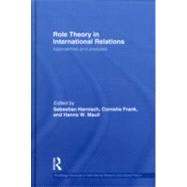- ISBN: 9780415614849 | 0415614848
- Cover: Hardcover
- Copyright: 5/2/2011
This volume explores the value added role theory can provide to Foreign Policy Analysis (FPA) and International Relations (IR) theory. Almost twenty five years after the path-breaking volume by Stephen Walker (1987), we take stock of recent theoretical and methodological developments in role theory itself and its evolving relationship with other strands of IR theory. In addition, we explore the policy implications of our theoretical reflections.We do so in three steps: the first section situates role theory in the context of rationalist and social constructivist approaches to foreign policy analysis and current IR debates on communicative action, pragmatism and discourse theory; it argues that role theory offers particular advantages as an integrative research framework. In the second section, both rationalist and constructivist scholars show how countries' foreign policy role conceptions change in response to new demands and expectations in international institutions, thereby linking role theory to socialisation, imitation and institutional reform. The third section evaluates the current role conception and enactment, i.e. foreign policy behaviour, of recent US administrations, including the Obama administration. We seek to advance the current role scholarship, which has stressed the coherence and continuity of role conceptions, by focussing on role change, intra- and inter-role conflicts and the impact of societal demands on the US national role conception. We find clear evidence that role changes, e.g. among the US role and the counter roles of its allies, have substantially affected the social structure of international relations.







